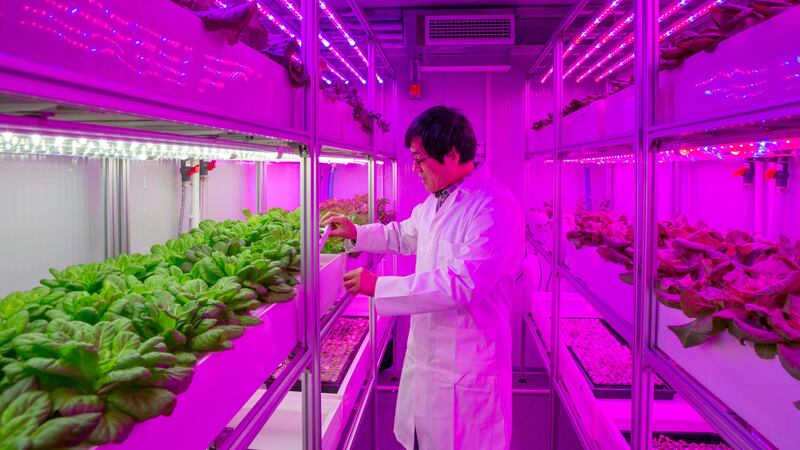A vertical farming system is being developed which researchers hope will address global food challenges by using hi-tech growing methods to produce large quantities of nutritious fresh crops all year round.
The system grows vegetables, salads and fruit, stacked vertically and without the need for soil.
It is being designed and engineered by scientists at Nottingham Trent University, in partnership with Henley Associates Ltd.
Two vertical farming units are being created, one about the size of a shipping container and the other about half the size.
They will act as an initial proof of concept, paving the way for more to be built for and used by retailers, caterers, local authorities and schools, experts say.
The project aims to help feed a rising urban population, tackle the challenge of decreasing arable land, and reduce the UK’s reliance on imported produce.
Researchers suggest the novel fully autonomous system will be capable of producing fresh food which is more nutritious, has far bigger yields and is ready to harvest in at least half the time.
It will not need favourable weather, fertile soil, lots of water and the usual high-running costs associated with the crop sector.
Logistical costs and environmental impact will also be reduced, and shelf-life maximised as the crops will be produced closer to the consumer.
Crops are in a nutrient-rich solution, plant roots are suspended mid-air in high humidity, and intermittently misted with a solution that increases nutrient use efficiency and plant growth with a surplus of oxygen at the root surface.
Solar panels will provide electricity to run the whole system.
The vertical farm will be created over the next two years – one will be based at the university’s Brackenhurst Campus and the other in Grantham, Lincolnshire.
Chungui Lu, professor of sustainable agriculture in Nottingham Trent University’s School of Animal, Rural and Environmental Sciences, said: “We are designing and engineering prototypes before carrying out a detailed feasibility study.”
He added: “We urgently need to develop new methods to enable intensive and sustainable crop production.
“We need an innovative container farming system that can be manufactured at low cost, is easy to install, unaffected by climates and seasons and can produce high-yields with high-quality crops with a significant reduction in carbon footprint.
“It’s also important to reduce reliance on imports, particularly given the UK’s exit from the EU. Each container is capable of producing three to five tonnes of crops a year.
“Using novel semi-mist culture methods, this will be an advanced, energy-efficient and carbon-neutral vertical farm for onsite use at retailers, schools and other organisations.
“By the end of the project we will have a new generation of containerised vertical farming that will improve UK resilience to environmental shocks and food security and will be beneficial for both the farming industry and society.”
Charles Brunton, director and project manager at Henley Associates Limited, said: “Food production has forever relied upon favourable weather and suitable soil.
“Vertical farming negates both of these factors – especially weather – as global warming takes effect worldwide, as has been witnessed in the UK over the past few years, resulting in failed crops, resown crops and reduction in yields.
“The vertical farming system is a major step forward in vastly reducing the carbon footprint of delivering fruit and vegetables by road from Europe and in particular air transport from across the world.”
The project has been funded by a UK Research and Innovation Innovate UK Smart Grant.








